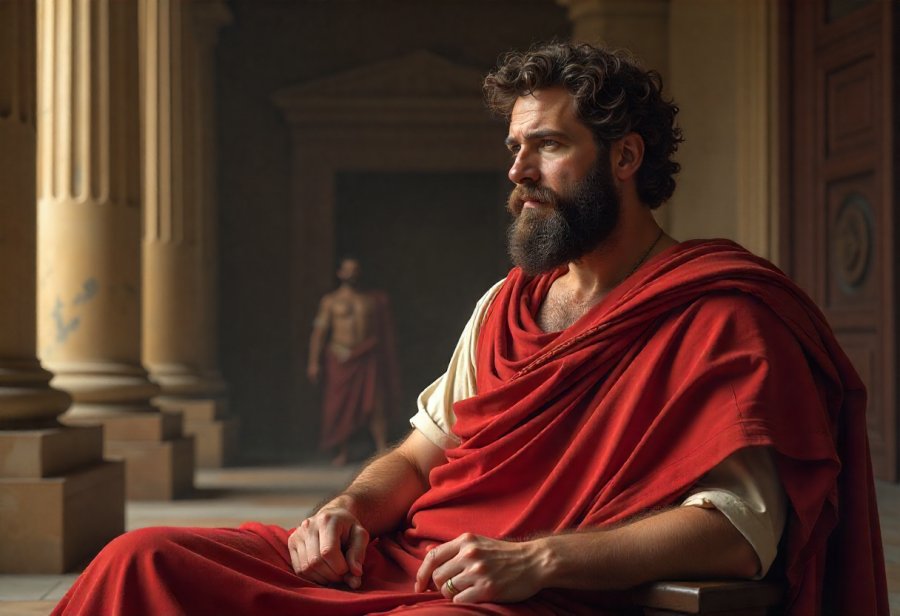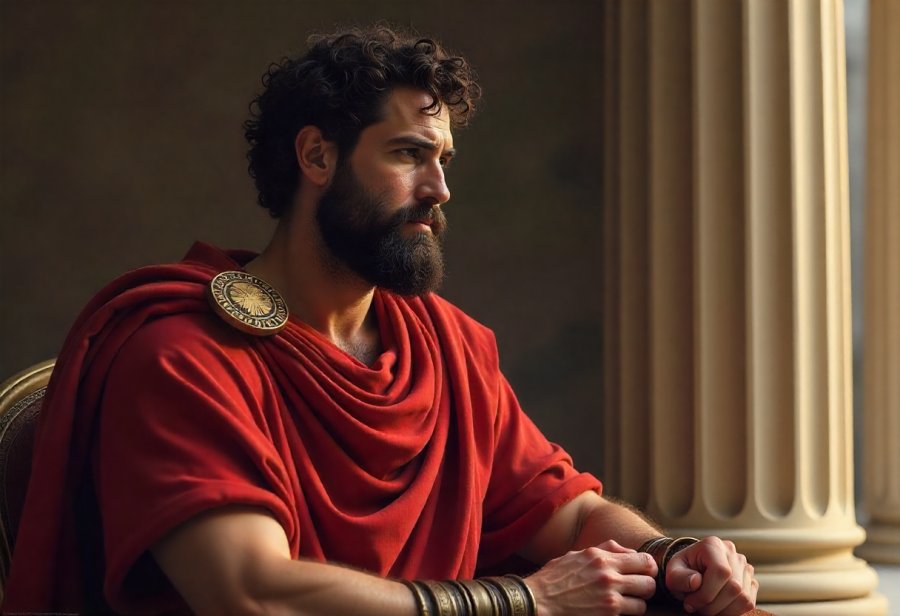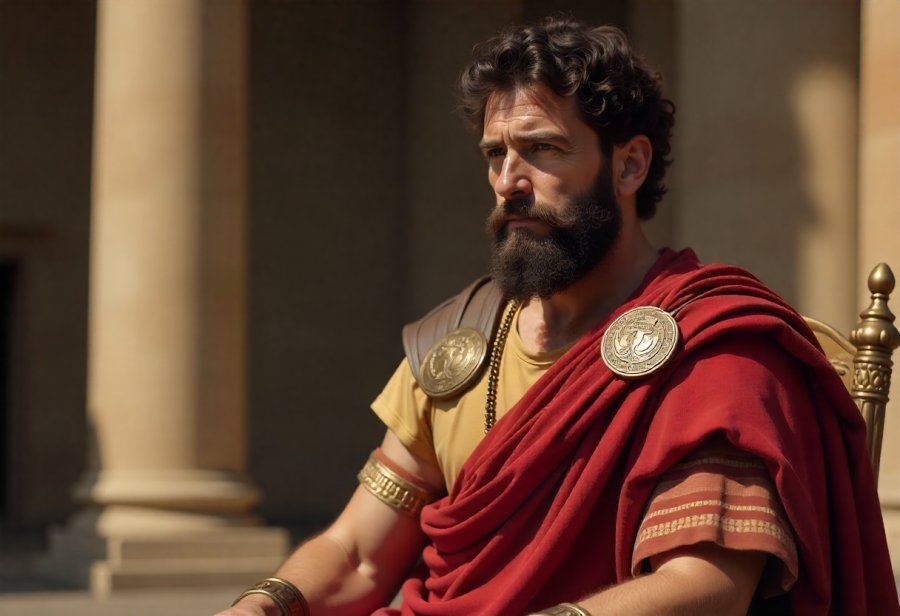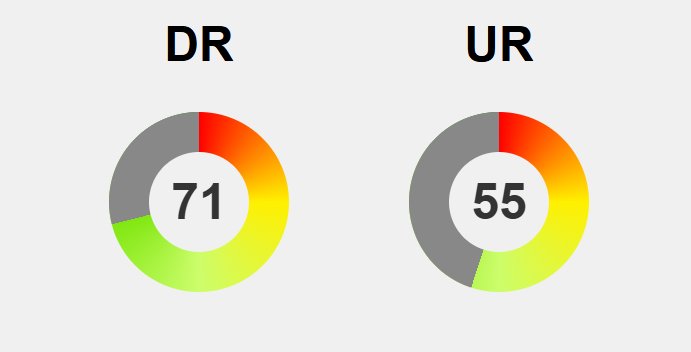
What if true strength doesn’t lie in external power or conquest but in mastering oneself? Marcus Aurelius exemplifies this paradox, demonstrating that inner discipline, wisdom, and resilience are the true foundations of leadership and legacy. Through his life—a turbulent blend of wars, plagues, and political upheaval—he relied on Stoic principles to maintain clarity and moral integrity, even amid chaos. His daily reflections in Meditations reveal a commitment to self-awareness, patience, and virtue, turning internal mastery into external influence. This timeless lesson invites us to consider whether our greatest achievements stem from cultivating a steady, resilient mind. As Marcus’s story shows, genuine power begins within, empowering us to face life’s challenges with calm confidence. Could embracing inner discipline transform not only our leadership but also our personal lives? This preview offers a profound exploration of how the quiet strength of self-control shapes enduring influence and true greatness.

Inner Discipline: The Hidden Power Behind True Leadership
Leadership is often associated with visible symbols of power—titles, armies, or grand achievements. But beneath these outward displays lies a quieter, more enduring kind of strength: inner discipline. This is the foundation that carries leaders through crises and chaos, shaping how they respond rather than what they simply accomplish. It’s not flashy or immediate, but it proves more resilient and effective over time.
Throughout history, some of the most respected figures have shown that governing oneself is the true mark of leadership. Marcus Aurelius stands out as a prime example. As a Roman emperor and philosopher, he believed that the greatest leaders are those who cultivate self-control and wisdom. His life reveals that leadership isn’t about wielding power over others but mastering oneself—controlling impulses, managing passions, and reflecting on virtue.
This internal mastery gave Marcus resilience amid the tumult of his reign. Facing wars, plagues, and political unrest, he relied on inner discipline to stay calm and centered. His writings in Meditations show a man committed to self-awareness, constantly examining his thoughts and actions. This focus on inner strength helped him make thoughtful decisions even in times of crisis and provided stability for his empire.
What makes his example so compelling is that his leadership was rooted in qualities anyone can develop. His calmness and clarity weren’t just natural traits—they were cultivated through daily reflection and philosophical practice. His ability to govern with patience and humility wasn’t about external dominance but about internal mastery. That internal resilience became a source of trust and loyalty among those he led.
In a world obsessed with external success, Marcus’s life reminds us that true strength begins inside. Cultivating inner discipline offers a way to navigate stress, make better decisions, and lead with authenticity. Building this steady core allows us to face external pressures with calm and purpose, much like Marcus did. His example shows that the most enduring leadership springs from wisdom and self-control, not just external achievements.
By embracing these principles, we can learn to govern ourselves more effectively. Inner discipline isn’t reserved for emperors or philosophers; it’s a practical skill anyone can develop. Through small acts like reflection, patience, and self-awareness, we can strengthen our resilience and clarity. These qualities not only improve how we lead others but also how we navigate our own lives amid uncertainty and change.
Stoic Virtues: Foundations of Inner Strength
Stoicism provides a clear and practical blueprint for cultivating inner discipline, emphasizing virtues like self-control, wisdom, and resilience. These principles are more than lofty ideals; they serve as guiding tools for how we respond to life’s inevitable challenges. Central to Stoicism is the idea that while external events are beyond our control, our reactions and attitudes are entirely within our power. This mindset shift allows us to develop emotional stability, helping us stay calm and focused even when faced with chaos or hardship.
Practicing self-control in this context means resisting impulsive reactions that can cloud judgment or lead us astray. It involves pausing before acting, choosing reason over emotion, and maintaining clarity of purpose. Wisdom complements this by guiding us to discern what truly matters, enabling us to prioritize virtue over fleeting pleasures or superficial success. Together, these virtues create an inner fortress—an unshakeable resilience that withstands setbacks and adversity without losing integrity.
Resilience in Stoic terms is about accepting difficulty as a natural part of life rather than avoiding it. Marcus Aurelius often reflected that external events are outside our influence, but our responses are within our control. Viewing obstacles as opportunities for growth transforms setbacks into foundations for inner strength, empowering us to face uncertainty with a steady mind and calm heart. This perspective turns adversity into a tool for developing mental toughness, reinforcing that strength arises from within.
Marcus’s writings reveal that cultivating these virtues is accessible to everyone. Developing self-control, wisdom, and resilience begins with small, deliberate practices—like mindful reflection, journaling, or pausing before reacting. Over time, these habits reinforce a resilient mindset, enabling us to handle stress and setbacks more effectively. The goal isn’t perfection but continuous progress toward mastering ourselves, much like Marcus’s daily reflections that helped him stay focused amid turmoil.
At its core, Stoic inner discipline is about governing oneself to navigate external chaos with clarity and purpose. It’s a timeless approach that remains relevant today, reminding us that true strength comes from within. Embracing virtues like self-control, wisdom, and resilience builds an internal foundation capable of supporting us through life’s ups and downs. This inner fortitude becomes our most reliable asset, guiding us to act with virtue and integrity regardless of circumstances.

Transformative Power of Inner Discipline in Leadership and Life
Inner discipline isn’t just a philosophical ideal; it has tangible benefits that extend well beyond the pages of Meditations. When leaders cultivate self-control, wisdom, and resilience, they become better equipped to handle crises, make thoughtful decisions, and earn genuine trust. These qualities enable them to navigate uncertainty with calmness and clarity, often proving more effective than relying solely on external displays of power or authority.
On a personal level, practicing inner discipline transforms our daily challenges. It helps us stay focused on goals, manage stress more effectively, and develop emotional stability. Whether dealing with a demanding project, difficult relationships, or setbacks, inner resilience provides a steady foundation that keeps us grounded. It’s about creating an internal environment resilient enough to weather external chaos without losing focus or purpose.
Looking beyond individual effort, we see that inner strength often outweighs external force. Figures like Gandhi and Mandela exemplify this—standing firm in their morals and patience, they inspired change without violence or coercion. Their lives demonstrate that true influence stems from character and inner mastery rather than external dominance. These lessons remind us that genuine power is rooted in self-control, moral clarity, and unwavering resolve.
In everyday interactions, choosing wisdom over impulse leads to better outcomes. Diplomatic conversations instead of confrontations, patience instead of reacting emotionally—these responses reflect inner strength. Marcus Aurelius showed how calm, deliberate reactions can build stronger relationships and foster trust. Often, it’s the composed, thoughtful responses that create lasting influence, not impulsive reactions driven by emotion.
Building inner discipline also cultivates respect and loyalty from others. People are naturally drawn to leaders and individuals who exhibit calmness, moral integrity, and authenticity, especially during tough times. Marcus’s example proves that influence rooted in internal mastery—governing passions and impulses—leads to genuine influence and admiration. This quiet strength may lack flash but endures, shaping both personal growth and effective leadership over time.
Ultimately, developing inner discipline is an ongoing journey that requires commitment and self-awareness. Embracing resources and practices that support this growth can make a significant difference. To explore practical strategies for cultivating inner discipline, consider reading about Inner Discipline and Its Role in Personal Development.
Marcus Aurelius: A Model of Inner Mastery Amidst Adversity
Marcus Aurelius’s life offers a vivid illustration of how inner discipline can shape effective leadership, even amid profound challenges. On the frontiers along the Danube, he faced relentless military threats and the daunting task of maintaining stability across a vast empire. Despite these pressures, he remained remarkably calm, turning to his meditations for clarity and guidance. Instead of reacting impulsively to crises, he used reflective practice to reinforce his Stoic principles, demonstrating that true strength lies in mastery over the mind rather than external force.
During the devastating plague that swept through Rome, many leaders might have succumbed to panic or abdicated responsibility. Marcus responded with humility and resolve, prioritizing the health and well-being of his people. His composed demeanor and moral clarity reassured both soldiers and civilians alike, showing that inner discipline can inspire confidence and loyalty even under the most difficult circumstances. It was this steadiness that allowed him to lead with compassion and purpose, setting a standard for resilience in leadership.
His writings in Meditations reveal a leader deeply committed to self-awareness. Marcus often examined his impulses, consciously working to suppress pride, anger, or despair that could cloud judgment. This ongoing internal assessment kept him grounded, enabling him to govern with patience and humility. His internal discipline didn’t merely serve his personal growth; it translated into a more just, stable rule that earned him respect across the empire. His ability to govern with calm and moral clarity became his greatest strength.
Even amid political unrest and betrayal, Marcus leaned heavily on his Stoic training. When faced with difficult decisions or personal doubts, he accepted what was beyond his control and focused on his responses. This mental resilience allowed him to navigate complex situations without losing composure, proving that internal strength is about harnessing emotion rather than suppressing it. His steadiness under pressure became a hallmark that inspired those around him and solidified his legacy.
Marcus’s example underscores that internal discipline isn’t about perfection but about consistent effort. His daily practice of reflection transformed setbacks into opportunities for growth, reinforcing that resilience built on self-control, wisdom, and humility can withstand external chaos. This internal fortress—crafted through deliberate thought and moral effort—enabled him to lead effectively while staying true to his values.
His capacity to govern with calm, humility, and moral clarity earned him loyalty far beyond his time. Marcus Aurelius exemplifies that genuine power begins within and that cultivating inner discipline creates a quiet, enduring influence. His life affirms that mastery over oneself is the foundation of lasting leadership—proof that the strongest rulers are those who govern their own minds first.

The Enduring Truth: Cultivating Inner Discipline for Lasting Strength
Inner discipline is the true foundation of genuine strength. Unlike external achievements or titles, it resides within us, shaping our reactions and guiding our decisions with calm and clarity. Marcus Aurelius exemplified this truth through his life and writings, demonstrating that mastery over oneself creates resilience, wisdom, and moral integrity that outlast fleeting successes. When we focus on cultivating inner discipline, we develop a steady core capable of supporting us through both calm and chaos, allowing us to face difficulties with patience and purpose.
This internal strength offers far more reliability and lasting power than external force. It’s not about suppressing emotions or denying ambition but about becoming aware of our thoughts and impulses. Marcus’s daily reflections and practices of self-control helped him act intentionally rather than impulsively. This inner mastery provided the stability necessary to lead effectively, even amid turbulent times. It reminds us that true leadership begins within and that lasting influence stems from the strength of character we nurture inside.
The lessons of Marcus Aurelius show that inner discipline isn’t reserved for philosophers or emperors; it’s accessible to anyone willing to make consistent effort. Small habits like mindful reflection, journaling, or pausing before reacting build a resilient mindset over time. Each act of self-awareness strengthens our capacity to handle stress, setbacks, and difficult decisions with calm and clarity. Developing this inner resilience becomes a reliable anchor—much like Marcus’s own daily discipline—that sustains us through life’s inevitable storms.
Beyond personal growth, inner discipline shapes how we engage with others and influence the world. Choosing patience over haste, wisdom over reaction, and moral clarity over shortcuts often leads to better, more meaningful outcomes. Marcus’s example demonstrates that influence rooted in inner mastery—governing passions and impulses rather than external appearances—creates authentic respect and loyalty. This quiet strength may lack flash but endures, leaving a legacy grounded in virtue and integrity.
In the end, the core message is simple yet profound: inner discipline is the greatest source of true strength. It’s the quiet, steady force that enables us to navigate adversity with grace, act with purpose, and build a legacy rooted in virtue. Each step in cultivating this resilience—through reflection, patience, and moral effort—brings us closer to the kind of leadership Marcus exemplified. The greatest power we possess is mastery over our own mind, and through that, we can face anything with confidence and calm.


